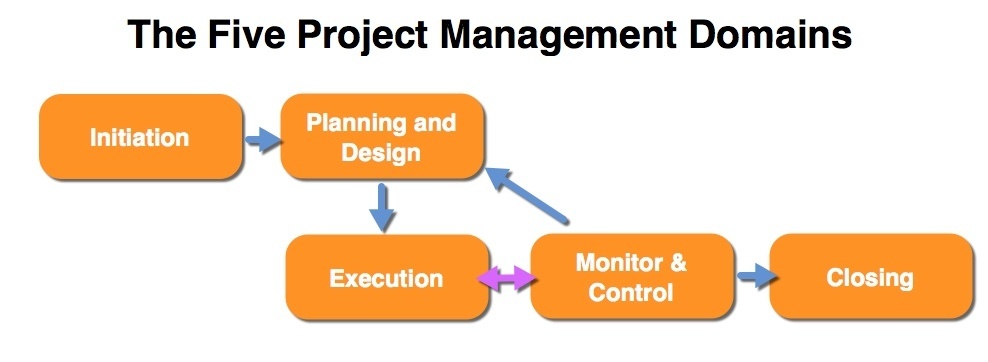Project Management Career Opportunities
 Many career pathways are becoming increasingly specialized but that’s not necessarily true for a project management career.
Many career pathways are becoming increasingly specialized but that’s not necessarily true for a project management career.
Other career paths have require specialized skills. For example, the all-purpose medical degree of the early eighteenth century has given way to over fifty different specialties ranging from anesthesiology to geriatrics to vascular surgery. Abraham Lincoln’s law degree he earned studying on his own to pass the bar exam now has narrowly focused areas of practice such as criminal law, civil rights law, estate planning and more.
The same is true for many other jobs as college degree plans and training programs drill down into more granular areas of knowledge.
But what if you don’t want to be a specialist in this brave new world?
There is one growing field that needs generalists who can deal with people, resources and processes independent of industry-specific training. In fact, you can have the opportunity to work in areas as diverse as manufacturing, legal services and healthcare. This is especially the case if you have:
- Well-developed communication skills
- Cross-discipline analysis abilities
- Clear and broad focus for abstract, big picture issues
That field is project management.
What Does Someone Do in a Project Management Career?
Project managers coordinate people and tasks, optimize schedules, and allocate resources for projects requiring team-level execution. The earliest known example of project management is the construction of the Great Pyramids. Project management came into its own in the nineteenth century due to the Industrial Revolution’s increased manufacturing and production capabilities in conjunction with mega-projects such as the Transcontinental Railroad and the Panama Canal. Today, professionals in a project management career are utilized in every business sector, including engineering, energy, financial services, healthcare and technology.
Project managers, no matter the industry, typically have a robust set of soft skills:
- Leadership
- Communication
- Problem solving
- Multitasking
- Flexibility
While project managers are sometimes degreed industry specialists, this is not necessarily the case. For example, L3 Technologies in Waco, Texas, performs extensive retrofits to military and commercial aircraft, which require highly skilled engineers and technicians. Project managers without engineering degrees, however, manage these teams. That’s why your resume need to reflect these soft skills (here is a sample project manager resume).
Educating for a Project Management Career
According to Project Management Institute’s (PMI) salary survey, 43 percent of project management professionals in the United States have a bachelor’s degree, while another 46 percent have a master’s degree. Only 12 percent, though, have a degree in project management, while 83 percent have the Project Management Professional (PMP) certification.
The PMP certification is awarded by the Project Management Institute (PMI). In addition to this type of certification, there are seven more specialized certifications available in such areas as business analysis and risk management. To be eligible to take the PMP certification exam, you must meet one of two sets of prerequisites:
- Secondary degree (high school diploma, associate degree or foreign equivalent); 7,500 hours directing and leading projects; and 35 hours of project management education
- Four-year degree; 4,500 hours directing and leading projects; and 35 hours of project management education
 The PMP certification exam consists of 200 questions from five different “domains,” each consisting of its own unique set of tasks:
The PMP certification exam consists of 200 questions from five different “domains,” each consisting of its own unique set of tasks:
- Initiating – assess project, identify deliverables, analyze stakeholders, assess risk and write project charter
- Planning – review project requirements and constraints; produce schedules; and develop management plans to present to stakeholders in the areas of communication, human resources, procurement, quality control, change and risk
- Executing – acquire resources; manage execution; and implement management plans in the areas of quality control, change, risk and communication
- Monitoring and Controlling – measure project performance, confirm deliverables meet quality standards, capture lessons learned and monitor procurement activities
- Closing – obtain acceptance of deliverables; obtain financial, legal and administrative closure; prepare final project report; archive project documents; and obtain stakeholder feedback
After you earn your PMP, you’ll have to complete 60 professional development units (PDUs) every three years to maintain it. The PMP exam is not cheap—over $400—and online prep courses can be a thousand dollars or more. But, the exam can be worth the time, effort and money for individuals and for organizations to offer it to their project managers. PMI statistics (granted, provided by PMI) indicate certified PMP professionals make 23 percent higher salaries than their uncertified counterparts.
According to PMI, businesses where at least one-third of professionals in project management careers are PMP certified finish more projects on schedule and on budget as well as meeting initially formulated project goals.
Most colleges and universities with project management programs offer certificates, which ultimately prepare students for the PMP exam. Three highly regarded ones are at Stanford University, the University of Virginia and DePaul University. Subjects covered include leadership, financial management, project scheduling, purchasing and procurement, organization design, and risk analysis.
There are even some traditional liberal arts colleges with project management programs, including Linfield College in McMinnville, Oregon and Marist College in Poughkeepsie, New York. Linfield offers an online bachelor’s degree with a curriculum based on PMI’s necessary areas of competency. Marist also offers a bachelor’s degree with online and on-campus options.
Project Management Career Outlook
According to PMI’s salary survey, the median salary for project managers is over $110,000. This is contingent, of course, on education and certification, years in the field, and level of experience with different project management systems (e.g., agile project management, extreme project management and project portfolio management).

PMI projects that over the next decade project management positions will increase by 33 percent across 11 countries.
That translates into 22 million new project management jobs.
Project managers are most commonly found in these five industries:
Project Management Institute (PMI)
Want to learn more about careers in project management? There are over thirty project management organizations you can check out, some for specific industries and others for different countries and geographic areas. PMI is the largest and most influential association because of its certification authority.
PMI was founded in 1969 to professionalize project management careers, promote the transfer of ideas and knowledge among practitioners, standardize terminology, and formalize training guidelines. Its Guide to the Project Management Body of Knowledge (PMBOK Guide) is a primary resource for project management and is regularly updated to incorporate new best practices. (You’ll need it when preparing for the PMP exam.)
Another flagship publication is the Project Management Journal, which even non-members can read for free. There is also a free membership option that allows you to track your certification progress. A paid membership with access to PMI online resources and additional benefits is $129 per year.
You want a career best suited to your abilities. That might not always consist of the hard skills associated with designing an airplane, trying a case in court or open-heart surgery.
Even in a time of ever-increasing specialization, the right soft skills set can be your key to a lucrative project management career in an industry of your choice around the world.
